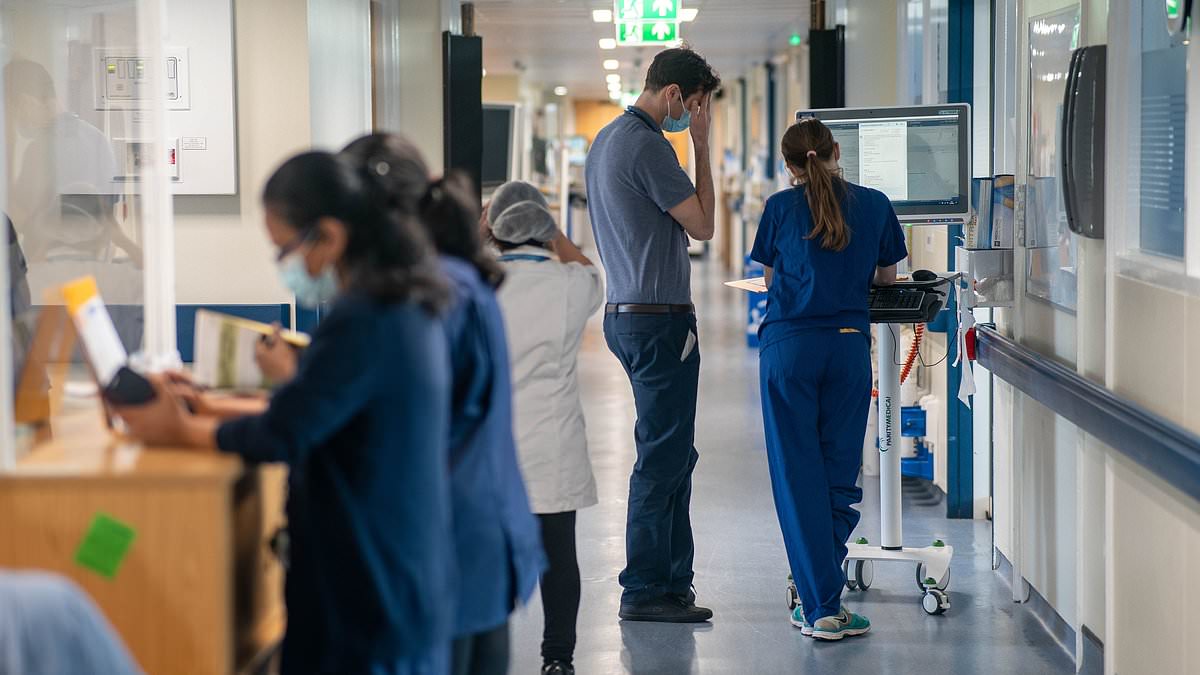Public satisfaction with the NHS has fallen to the lowest level on record amid poor access to GPs and long waits for hospital care.
Fewer than one in four (24 per cent) people were happy with the health service in 2023, down 5 percentage points on the previous year alone.
It is the lowest level since records began in 1983, according to latest findings from the British Social Attitudes Survey.
The study, of 3,374 people in England, Wales and Scotland, is seen as the gold-standard test of how people feel about the NHS.
It reveals more than half (52 per cent) are now dissatisfied with the NHS, the highest proportion since the survey began.
The main reasons for dissatisfaction are waiting times for GP and hospital appointments (71 per cent), followed by staff shortages (54 per cent) and the Government not spending enough money on the NHS (47 per cent), despite record investment.
Health think tanks said there had been an ‘unprecedented downward spiral’ in public satisfaction in recent years and warned political leaders should take note of the ‘depressing’ results ahead of the general election.
Satisfaction with the NHS peaked in 2010, when 70 per cent of people were happy with the health service but it has since fallen.
It has suffered a particularly rapid decline of 29 percentage points since 2020, when services were crippled by the Covid-19 pandemic.
Strikes by nurses, junior doctors and consultants have also led to the widespread cancellation of operations and appointments over the past year.
Only one in three (34 per cent) people were satisfied with GP services in 2023, the lowest since the survey began. Some 41 per cent were dissatisfied.
Since 2019, satisfaction with GP services has fallen by 34 percentage points, with many patients now facing an 8am scramble for appointments and a battle to see a family doctor face-to-face.
There were also problems with dentistry, with a record low satisfaction level of 24 per cent and a record high dissatisfaction of 48 per cent.
It comes as Britons struggle to find an NHS dentist that is open to new patients in some areas, with people forced to pull out their own teeth at home.
Satisfaction with both inpatient and outpatient hospital services remain at record low levels.
However, support for the founding principles of the NHS remains high, with 91 per cent believing the NHS should be free of charge when people need to use it, 82 per cent agreeing it should be primarily funded through taxes and 82 per cent saying the NHS should be available to everyone.
The King’s Fund and the Nuffield Trust sponsor the health and care questions in the poll, which is carried out by the National Centre for Social Research (NatCen).
Their analysis report said: ‘A decade of squeezed funding and chronic workforce shortages followed by a global pandemic has left the NHS in a continual state of crisis.
‘Changing the model of the NHS is not something the public wants – they just want the model they have got to work.’
Dan Wellings, senior fellow at the King’s Fund, said: ‘The results are bleak, but should not be surprising after a year of strikes, scandals and sustained long waits for care.’
He added: ‘With the health service increasingly unable to meet the expectations and needs of those who rely on it, public satisfaction with the NHS is now in uncharted territory.
‘Ahead of the upcoming general election, political leaders should take note of just how far satisfaction with this celebrated public institution has fallen.’
Regarding Government priorities and NHS spending, 48 per cent of people thought ministers should ‘increase taxes and spend more on the NHS’, 42 per cent chose ‘keep taxes and spending the same’, and 6 per cent chose ‘reduce taxes and spend less on the NHS’.
